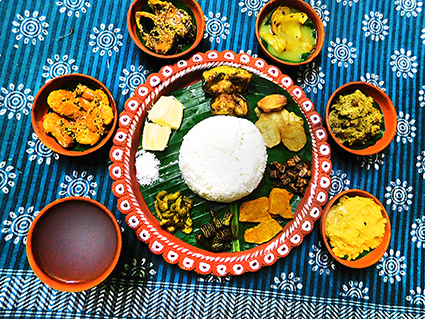Vishwakarma Puja brings with it another festival in Bengal – Arandhan (meaning ‘No Cooking’). Arandhan has a connection with the Indian freedom struggle, as many people practised it as a sort of protest against British torture. It is said that after freedom fighter Jatin Das’s death, the whole of Howrah district had observed Arandhan for a day.
Traditionally, this festival of ‘no cooking’ is done to give the kitchen a day’s rest. The utensils and kitchen equipment are worshipped, or shown respect, including the grinding stone, the iron mortar and pestle and even the clay stove. The festival is commonly called ‘Ranna Puja’. The family members start cooking the day before Vishwakarma Puja and after completing all the food items, they clean the entire kitchen and prepare it for the next day’s rituals. The next day’s meal comprises cold food.
The menu is unique and includes some mandatory items.
Rice: Cooked the previous night, the boiled rice is soaked in water overnight (panta) along with a few slices of Gandharaj Lemon to give it a delectable aroma.
Dal: Khesari dal is a mandatory item on the menu.
Fritters: These can be unlimited. Five to seven different types of fries are made. These include brinjal, pumpkin, ladies finger, snake gourd, coconut and other vegetables of the season. A tasty item is the alu posto bhaja which is crispy potato fried with poppy seeds.
Vegetables: A mixed vegetable made with Taro (kochu), coconut and gram seeds
Fish: Hilsa is a must on this occasion. A finger-licking sorse ilish tops the menu. Some families also like to include jumbo prawns preparation, but that is optional.
Chutney: Elephant apple (Chalta) is another mandatory item as this is the season of the fruit. Slices of chalta are made into a sweet and sour pickle that gives the perfect finish to the meal
Beverage: Called Amani, this drink is prepared with the water in which the rice is soaked through the night. A pinch of salt and lemon juice makes it a good digestive after a sumptuous meal.



